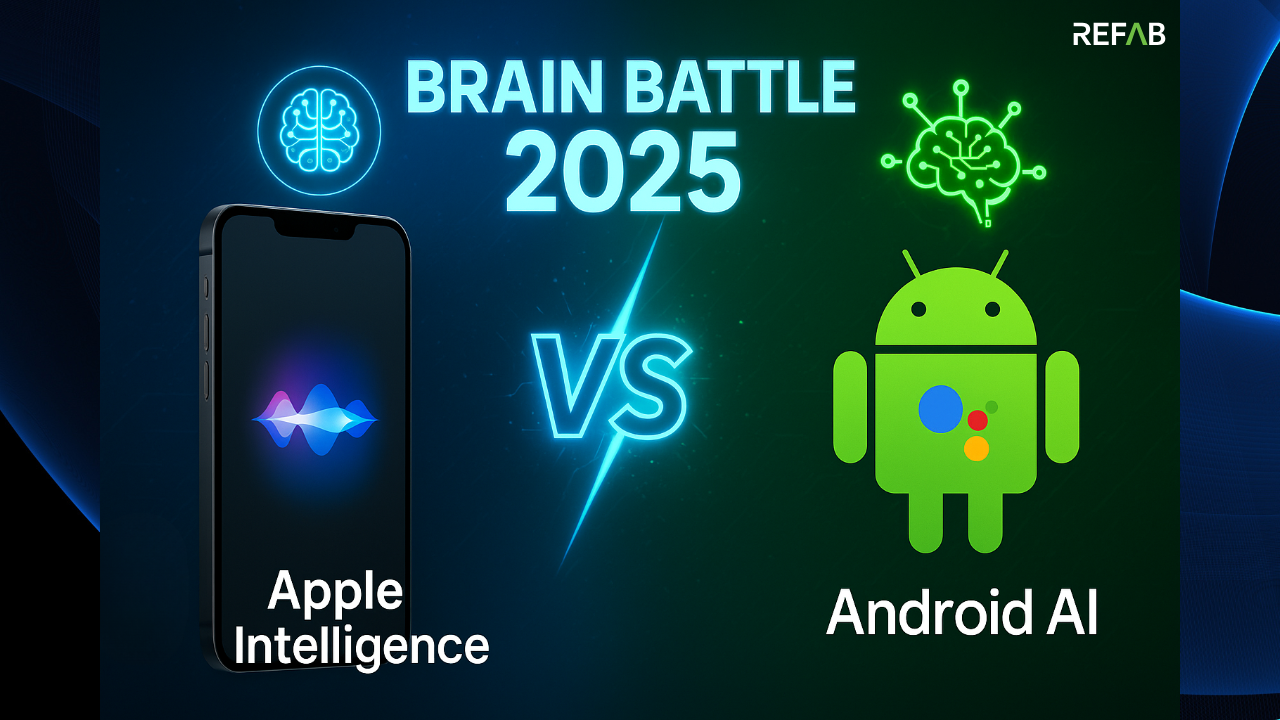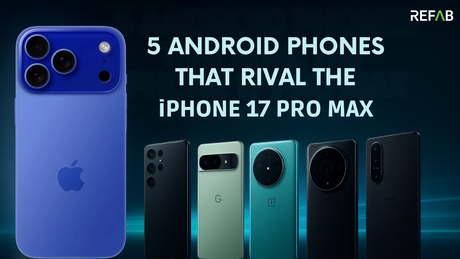Introduction
Artificial intelligence is no longer science fiction — it's living in your pocket. In 2025, both Apple and Android manufacturers (led by Google and Samsung) are doubling down on AI, transforming everyday smartphones into highly intelligent companions. But what sets Apple Intelligence apart from Android AI? Which is smarter, more helpful, and truly worth your attention? Let’s dive into this epic tech rivalry.
- Foundational Philosophy: Privacy vs. Openness
Apple Intelligence prioritizes on‑device processing for privacy, with sensitive tasks happening locally and heavier tasks managed via secure Private Cloud Compute. This means fewer privacy leaks and more control.
Android AI, especially in Google Pixel and Samsung Galaxy devices, emphasizes powerful cloud integration. Google’s Gemini handles large-scale processing off-device, accompanied by detailed settings for users to manage data sharing.
Verdict: Apple leads in privacy enthusiasts; Android caters to those who want powerful AI and cloud features with transparent data controls.
- Assistant Performance: Siri vs Google Assistant
- Siri (via Apple Intelligence):
- Now supports ChatGPT integration – mix of local and cloud-based AI
- Upcoming improvements in personal context awareness and on-screen understanding are expected by late 2025 or early 2026
- While revolutionary conversational Siri got delayed, incremental upgrades are rolling out via iOS 18.x.
- Google Assistant (Android AI):
- Already supports multiturn natural interactions, contextual follow-ups, and deep Google integration.
- Additional Android OEMs (Samsung, OnePlus) are embedding custom AI features like Samsung’s “AI enhancements” and OnePlus’s “Plus Key/AI Plus Mind”.
Verdict: Google Assistant currently offers smoother natural conversation and deep context handling. Siri is catching up but still trailing in conversational fluency.
- Creative & Visual AI Capabilities
- Apple Intelligence:
- Image Playground offers cartoon-style, illustration, and soon “Sketch” style imagery
- Genmoji for personalized emojis is present on iOS/iPadOS; Mac support arrives in 2025
- Memory Movie tool on Mac for auto video montages using descriptions and photos
- Android AI:
- Google Photos (on Android) celebrated its 10th anniversary with intelligent editing tools, sharing via QR, and better AI-assisted enhancements
- Samsung often integrates in-house improvements (e.g. AI photo processing)
- Third-party apps leveraging Google’s ML Kit deliver powerful image editing and filters.
Verdict: Apple has crafted unique creative experiences with Animation, Sketch, Genmoji, and Memory Movies. Android counters with strong photo editing and broad third-party innovation.
- Cross-Platform Ecosystems & Developer Support
- Apple:
- Launching developer tools at WWDC 2025, allowing third-party apps to integrate Apple’s AI models
- Rolling out iOS 26, macOS Sequoia, and watchOS 26, unifying experience across devices
- Integration of Siri shortcuts and cross-device consistency
- Android:
- Open ecosystem—OEMs can integrate Google’s AI and third-party tools easily
- Samsung’s One UI and OnePlus’s AI boosters show OEM-customized intelligent features
- Google’s more flexible API options for developers enable rapid innovation.
Verdict: Apple offers seamless integration for those fully invested in its ecosystem. Android leads when it comes to flexibility and diverse device optimizations.
- Real-World Utility & Daily Impact
- Apple Intelligence (current):
- Smart priority notifications, advanced writing tools, photo cleanup, summaries, and Genmoji
- “Memory Movie” feature brings nostalgia with AI-curated slideshows
- Upcoming enhanced Siri for real-time screen actions and personal commands
- Android AI (current):
- Google Assistant handles natural dialogue, reminders, and contextual search
- Pixel devices pack unique AI features—live caption, call screening, intelligent battery
- OEMs include exclusive AI capabilities:
- OnePlus includes Plus Key & AI Mind
- Samsung includes AI enhancements across camera and UX
Verdict: Currently, Android has more practical, day-to-day AI uses. Apple shines in specialized areas like content generation and photos, with functional Siri steps coming soon.
Overall Comparison
|
Feature |
Apple Intelligence |
Android AI (Google, Samsung, OnePlus…) |
|
Privacy |
On-device + encrypted cloud processing |
Heavier reliance on cloud with user controls |
|
Conversational Assistant |
Siri with ChatGPT—evolving |
Google Assistant is mature & conversational |
|
Visual Creativity |
Image Playground, Genmoji, Memory Movies |
Strong photo edits, filters, third-party apps |
|
Developer Ecosystem |
Tight integration via WWDC tools |
Flexible OEM/customized intelligent UIs |
|
Everyday Utility |
Summaries, smart notifications |
Natural dialogue, battery optimizations, screens |
Final Verdict: Who Wins?
- Choose Apple if you value privacy, sleek on-device AI experiences, and creative tools for visuals and writing.
- Choose Android if conversational strength, practical utilities, multi-device flexibility, and faster AI innovation excite you.
In reality, both offer unique strengths — Apple leans into personal creativity and privacy, while Android focuses on deep assistant intelligence and openness. For tech enthusiasts, the best choice depends on which values matter most today
What’s Next?
Be sure to follow WWDC 2025 on June 9—Apple is expected to unveil expanded third-party AI integrations and iOS 26 features. Meanwhile, Google and OEMs continue pushing boundaries with AI-enhanced UX across devices. The AI smartphone war is heating up — stay tuned.
At Refab.me, we deliver across Gujarat with 1-day delivery, a 1-year warranty, free shipping, and the best prices on a wide range of new and renewed Apple and Android phones—capturing stunning photos with top-tier cameras. Shop smart, sustainable, and affordable only at www.refab.me.








